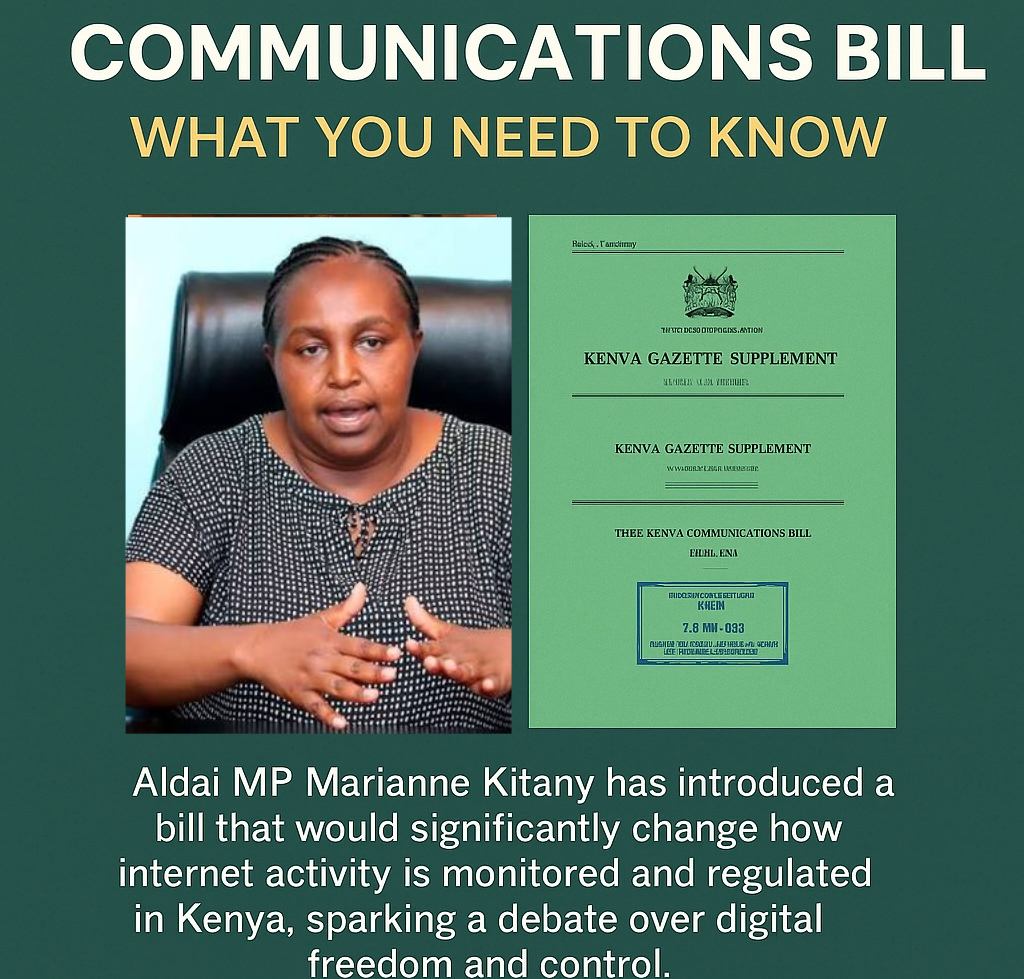Keeping Up with the Discourse is a Radio 254 series, exploring the issues shaping Kenya’s public conversation.
In the latest chapter of Kenya’s evolving digital landscape, a new bill tabled by Aldai MP Marianne Kitany has ignited a firestorm of debate. The Kenya Information and Communications (Amendment) Bill, 2025, seeks to overhaul how Internet Service Providers (ISPs) and internet users are regulated, raising critical questions about the balance between cybersecurity and fundamental freedoms. For a nation where social media has become a powerful tool for activism and critique, particularly among its tech-savvy youth, the bill arrives at a pivotal moment. This article, part of Radio 254’s Keeping Up with the Discourse series, unpacks the bill’s proposals, the political context surrounding its sponsor, and the broader implications for Kenya’s digital democracy.
The Bill: A New Framework for Digital Regulation
The proposed legislation introduces sweeping changes to Kenya’s digital ecosystem. At its core, the bill aims to enhance government oversight of online activities, granting authorities the power to monitor user communications—potentially including emails, WhatsApp messages, and SMS—under the guise of national security. This would require ISPs to facilitate real-time data sharing, possibly through court orders or parliamentary mandates, building on existing laws like the 2018 Computer Misuse and Cybercrimes Act (CMCA). Additionally, the bill floats the idea of metered internet billing, where users pay based on data consumption, and mandatory ID verification to link online activities to real-world identities. Non-compliance could attract hefty fines (up to KSh 1 million, approximately $6,250) or imprisonment for up to a year.
To implement these changes, the Communications Authority of Kenya (CA) and the National Computer and Cybercrimes Coordination Committee (NCCCC) would gain expanded powers to enforce compliance, including recommending website blocks for content deemed harmful, such as disinformation or pornography. ISPs might also be required to establish local offices, ensuring accountability to Kenyan regulators. While these measures aim to curb cybercrime and enhance digital governance, they have sparked concerns about overreach, particularly in a country where online platforms have become battlegrounds for political expression.

Marianne Kitany: The Woman Behind the Bill
Marianne Kitany, the bill’s sponsor, is a prominent figure in Kenya’s ruling United Democratic Alliance (UDA) and a staunch ally of President William Ruto. Representing Aldai Constituency, Kitany has positioned herself as a champion of transformative policies, from digital innovation to economic reforms. However, her visibility has also drawn scrutiny, particularly in connection to the 2024 fake fertilizer scandal that rocked the agricultural sector. The scandal, which implicated then-Agriculture Cabinet Secretary Mithika Linturi, centered on the distribution of substandard fertilizer, devastating farmers and fueling public outrage. While Kitany was not directly implicated, her vocal support for the Kenya Kwanza coalition during parliamentary debates defending Linturi drew criticism from opposition MPs, who accused the government of shielding allies. Her role in tabling this controversial bill has only intensified public focus on her political motives, with some questioning whether it aligns with broader efforts to consolidate state control.
A Regional and Continental Context: Youth Activism and Government Pushback
The bill’s timing is no coincidence. Across East Africa, governments are grappling with a tech-savvy, youthful populace increasingly using social media to challenge poor governance. In Kenya, Generation Z—born between 1997 and 2012—has harnessed platforms like X, TikTok, and Instagram to drive movements like the 2024 #RejectFinanceBill protests, which forced the government to reconsider punitive tax hikes. Similar dynamics have unfolded in Nigeria with #EndSARS and in Uganda, where youth-led campaigns have exposed corruption. These movements, often amplified by AI-generated content and viral satire, have unnerved authorities, who view digital activism as a threat to stability. The Kenyan government, for instance, labeled the 2024 protests as “organized cyberattacks,” citing disinformation as a risk to national credibility.
This regional trend of digital dissent has prompted governments to tighten online regulations. Tanzania requires bloggers to pay licensing fees, while Uganda has imposed social media taxes. Kenya’s proposed bill fits this pattern, reflecting a broader push to control digital spaces amid growing public discontent. Yet, this approach risks alienating the very youth driving Kenya’s digital economy, which boasts a 32.7% internet penetration rate as of 2023.
Kenyan Concerns: A Threat to Freedoms?
The bill has elicited sharp reactions from Kenyans, particularly digital activists, journalists, and civil society groups, who fear it will erode hard-won freedoms. The right to privacy, enshrined in Article 31 of Kenya’s Constitution, is at stake, with mandatory ID verification and data monitoring threatening to expose personal communications. The 2019 Data Protection Act was meant to safeguard such rights, but critics argue the bill could undermine these protections, especially given past scandals like Cambridge Analytica’s misuse of Kenyan voter data. On X, users have decried the bill as a step toward a “digital dictatorship,” with tech entrepreneur Mark Kaigwa emphasizing that online activism is “within citizens’ rights.”
The vague definition of “false information” in the bill heightens these concerns. The Bloggers Association of Kenya (BAKE) has long challenged similar provisions, citing their potential to silence dissent. For a nation celebrated as a regional leader in press freedom, the bill’s implications are profound, potentially stifling the vibrant discourse that defines Kenya’s digital public square.
The Other Side: Justifications and Global Precedents
Proponents of the bill, however, argue that regulation is overdue in an era of rising cybercrime and online harassment. Globally, countries like South Africa and India have adopted metered internet billing to manage network congestion and fund infrastructure, a model that could support Kenya’s digital expansion. Similarly, ID verification, as seen in China and South Korea, aims to curb anonymity-driven crimes like fraud and cyberbullying. In Kenya, a 2020 report highlighted that over 25% of women face online gender-based violence, including disturbing cases where AI tools like Grok were misused to create harmful content, such as editing images to depict nudity. The 2024 protests, fueled by AI-generated deepfakes mocking leaders, further underscore the risks of unregulated digital spaces.
The Kenyan political class may seize on these issues to justify the bill, framing it as a necessary response to cyber threats and social instability. The global precedent of Brazil’s 2024 clash with X over ID verification and disinformation offers a cautionary tale. Brazil’s Lula administration pushed for stricter controls, citing public safety, but faced resistance from Elon Musk, who prioritized free speech. Public backlash ultimately forced Brazil to soften its stance, highlighting the influence of global tech platforms.
A Contradiction for Kenya’s Digital Future
Kenya stands at a crossroads. The fight against cybercrime, harassment, and AI-driven disinformation is undeniably urgent—75% of Kenyan news consumers struggled to identify fake news during the 2022 election, a vulnerability exacerbated by deepfakes and propaganda. Yet, the bill’s heavy-handed measures risk undermining the freedoms that have empowered Kenya’s digital activism, from #RejectFinanceBill2024 to grassroots campaigns exposing corruption. The contradiction is stark: how does a democracy protect its citizens from digital harms without stifling the voices that hold it accountable?
The Brazil-X standoff offers a glimpse of what may unfold in Kenya. Foreign social media companies, particularly those like X without local offices, are likely to resist compliance, leveraging their global clout to challenge restrictive laws. Platforms like Facebook, with a stronger local presence, may partially cooperate to avoid sanctions, but full compliance seems unlikely given Kenya’s decentralized internet infrastructure. The government’s ability to enforce the bill will depend on its willingness to confront these tech giants, a battle that could reshape Kenya’s digital landscape.
As Kenya navigates this tension, the stakes are high. The bill reflects a broader East African struggle to harness digital innovation while containing its disruptive power. For a nation where youth-led activism has redefined civic engagement, striking the right balance between security and freedom will determine whether Kenya’s digital public square remains a beacon of democracy or a casualty of control. In the words of one X user, “The internet is our voice—regulate it, but don’t silence it.”
Written by Otieno Arudo





